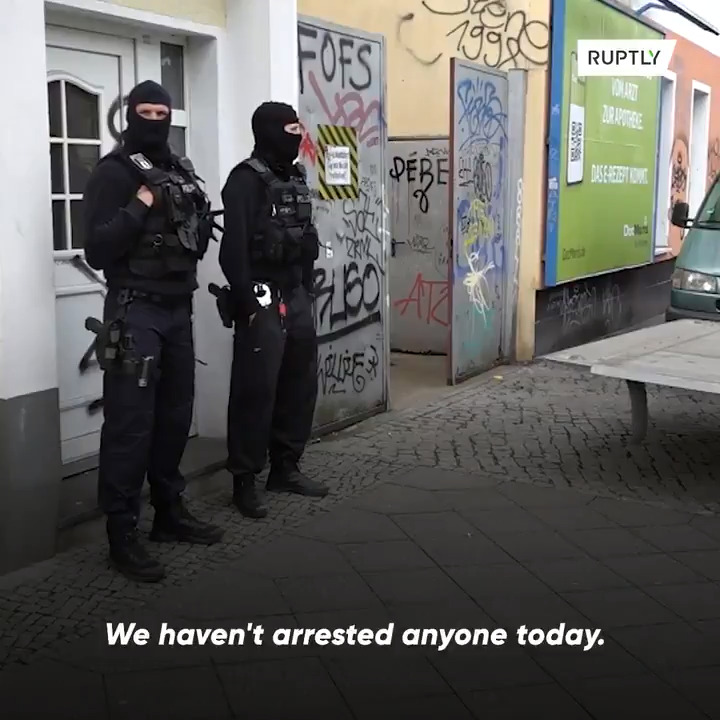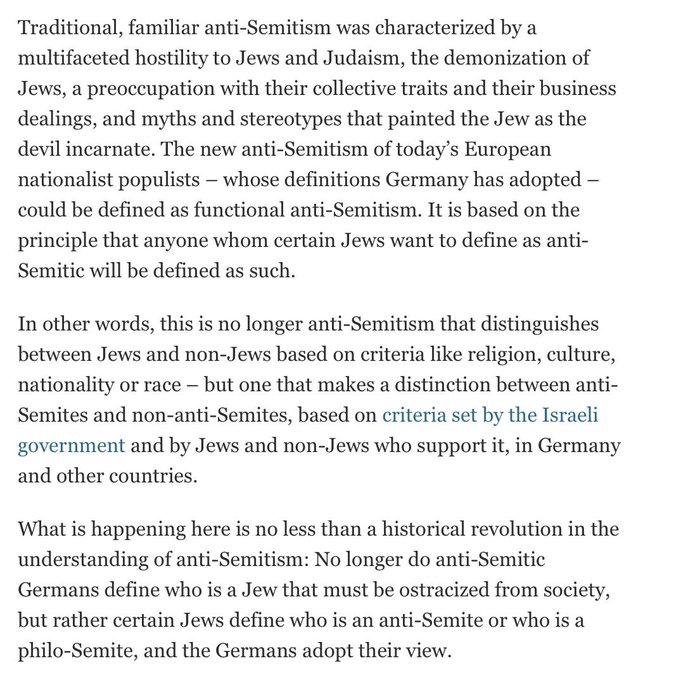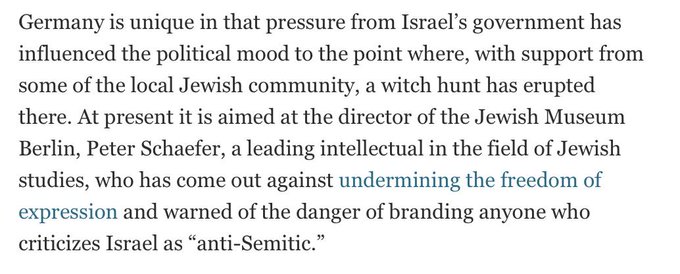
Hezbollah has never been charged with any crimes in Germany nor does it have an official presence in the country. Why then is it being treated as a major threat to German society and security?
By Denijal Jegic
Following a long lobbying campaign from within the country and from abroad, the German government banned all activities of the Lebanese movement Hezbollah this April 30, designating it a “Shia terrorist organization.” The decision put Hezbollah in the same category as ISIS and Al Qaeda, Sunni transnational extremist groups that have claimed credit for attacks on civilians on German soil.
Following the ban’s announcement, special police forces raided mosques and Shia institutions accused of supporting Hezbollah across Germany. The action came after years of German ambivalence towards the Shia movement and mounting U.S. lobbying.
In fact, Hezbollah has never been charged with any crimes in Germany nor does it have an official presence in the country. Why then is it being treated as a major threat to German society and security?
Expanding the terrorist label to conform to US and Israeli demands
The ban on Hezbollah is the clear product of U.S. pressure on Berlin and Germany’s insistence on Israel’s security being the German raison d’etre. To understand the German ban, it is therefore necessary to examine Hezbollah’s history of conflict with Israel.
Hezbollah is a Lebanese armed resistance movement, political party, and guarantor of infrastructure and social, economic, and health services for a large sector of Lebanon’s population. It was formed in the 1980’s with Iranian support as a defensive mechanism against Israel’s US-backed military occupation of South Lebanon.
Hezbollah was decisive in Lebanon’s liberation from Israeli occupation in 2000. Six years later, it successfully defended the country against another Israeli military onslaught and is largely credited with helping to defeat Al Qaeda and ISIS during the proxy war in neighboring Syria.
Besides its role as a deterrent factor against Israel, Hezbollah has been democratically elected to serve in Beirut’s parliament. It has governed in coalition with the Christian Free Patriotic Movement and, despite its Shia character, has supporters and opponents throughout different sects and regions of Lebanon.
As an Arab movement that managed to score victories against Israel, and which has strong ties to Iran, Hezbollah is viewed as a particular threat by the United States and its proxies, which have widely used the term “terrorist” to delegitimize the movement.
As U.S. sanctions against Iran intensified, Washington’s approach towards Hezbollah grew increasingly aggressive. Recently, the United States tried without success to present the popular anti-corruption protests that shook Lebanon throughout 2019 as an anti-Hezbollah uprising.
Germany’s ban was sold to the public by the country’s major political parties and mainstream media as a measure to protect Israel. In equating resistance to Israel with anti-Jewish racism, the government has presented the ban as an effort against anti-Semitism.
Like the European Union, Germany had until recently been able to distinguish between Hezbollah’s political and military arms. The EU banned the military wing in 2013, but after the United Kingdom outlawed Hezbollah in its entirety in 2019, Germany claimed that it would not follow suit.
Niels Annen, a representative of the German Foreign Ministry, told Der Spiegel at the time that it was senseless to ban Hezbollah. While he referred to Hezbollah’s activities as “terrorist,” he acknowledged that the movement was represented in the parliament, part of the government and “a relevant social factor and part of the complex political situation in Lebanon.” Annen also rejected U.S. criticism of Germany for failing to sufficiently counter “Iran’s influence.”
In June 2019, the Islamophobic, far-right AfD party proposed a ban on Hezbollah to the German parliament. As has become common for far-right movements in Europe, the AfD strongly supports Israel’s settler-colonial project and upholds Israel as a role model for its successful racist policies. Party leaders also view supporting Israel as a convenient way to legitimize their Islamophobic propaganda while tamping down on allegations of anti-Semitism stemming from the AfD’s roots among post-war Nazi party holdovers.
Meanwhile, U.S. pressure mounted on Germany to authorize the ban. In September 2019, the right-wing U.S. ambassador to Germany and Director of National Intelligence Richard Grenell published an op-ed in the German paper, Die Welt, claiming without a shred of evidence that Hezbollah, as “Iran’s most-violent terrorist representative,” was still allowed to recruit members in Germany and ask for financial donations.
Grenell urged Germany to ban Hezbollah as a sign of its opposition to Syria’s Assad, antisemitism, and to “signal that it does not accept violence, terror, and anti-Semitic hatred in Europe.” Grenell even claimed that Hezbollah recently planned “terror attacks and murders on European soil.” Once again, he offered zero evidence. (Grenell has said he seeks to “empower” far-right movements and parties across Europe).
In October 2019, after a right-wing extremist White German carried out a an anti-Semitic assault on a synagogue in eastern Germany, David Harris, an Israel lobbyist who serves as CEO of the American Jewish Committee, exploited the right-wing terror attack to clamor for a German ban on Hezbollah. Though Hezbollah had nothing to do with the attack, or any other racist assault on Jews in Germany, Harris insisted the ban was necessary to “show strength” and “real determination in the war against terror.”
A month later, the German Interior Ministry reaffirmed that it did not plan to ban Hezbollah. However, by December, the governing CDU (Christian-Democratic Union) and SPD (Social Democrats), as well as the FDP (Liberals), introduced a parliamentary resolution demanding a ban. The resolution reaffirmed Israel’s security as Germany’s raison d’etre and stressed the importance of “strengthening the close partnership with Israel for the future.” The text focused on “Iran’s continuous aggressive policies,” and named Hezbollah “the most crucial of these anti-Israeli forces.”
Similar rhetoric was used to justify the actual ban on April 30. Foreign Minister Heiko Maas claimed that “Hezbollah openly calls for the violent elimination of the State of Israel and questions the right of the State of Israel to exist.” Fully adopting the Israeli narrative, Maas argued that Hezbollah was “threatening with violence and terrorism.”
AfD chairwoman Beatrix von Storch, claimed the ban as a victory for the AfD, stressing the far-right party had “put pressure on establishment parties.” She then called for more draconian measures, demanding a complete “organizational ban” of Hezbollah because there was “no place in Germany for Israel haters.”
The United States, Israel, Saudi Arabia, and a who’s who of pro-Israel organizations across the West expressed their gratitude to Germany.
“Israel-haters” and “Terror Militia”: Incitement in the media
The government’s decision was uncritically reported across the German media landscape, which largely refers to Hezbollah as a “terror organization” and “terror militia.”
Some commentators praised the “blow against Israel-haters;” others complained that the step was long overdue. Much was made of Hezbollah’s “mighty influence” in Lebanon, and quotes were solicited from individual Lebanese people who opposed the movement.
The largest German-language newspaper worldwide, “Bild,” published seven articles supporting the ban on April 30 alone. One referred to the police actions as a “fight against terrorism.” Others implied that Germans should brace themselves for a wave of Hezbollah’s “revenge terrorism.” The blitz of articles featured headlines like, “Is the terror threat rising amongst us?” and “Who is terror chief Hassan Nasrallah?” Bild claimed, for example, that Hezbollah “developed solid structures in Germany, disguised through mosques and cultural institutions.”
Anyone who consumed the propaganda wave without critical detachment would have likely been convinced the Hezbollah was the leading threat to Germany’s security and order.
Does Hezbollah pose a threat to Germany?
Since Hezbollah does not officially exist in Germany, it cannot be formally banned as an organization. The ban therefore represents a prohibition on all activities and display of symbols associated with Hezbollah.
The raids on mosques have upset many within Germany’s Muslim community, especially because mosques were stormed without announcement during the month of Ramadan, and amid already existing wave of anti-Muslim incitment in the country.
No imminent threat was declared by authorities, nor was anyone arrested after the ban. The searches might have served to find evidence that could be used to accuse individuals and institutions of Hezbollah sympathies or links in order to take legal measures against them in the future.
Lebanese-German lawyer and activist Ali Chaukair told The Grayzone that the latest measures could only be seen as an attempt to bully Shia Muslims into silence. However, he was certain that the targeted Shia institutions would continue their work “because their activities have been in accordance with the law.”
The claim that they have been involved in terrorist activities is unfounded and shameful for Germany, according to Chaukair. Many within the affected communities have stressed their positive relations with state authorities. These included the Al-Irschad Community in Berlin, which statedthat it would continue its commitment to society and its peaceful work in Islamic teaching and inter-religious dialogues.
For its part, the Islamic Communion of Shiite Communities in Germany issued a statementexpressing “sadness and dismay” that police entered closed mosques with bulletproof vests, armed with machine guns and acting “with disproportionate brutality and disregard for any religious consideration,” leaving disorder and Qurans on the floor.
The majority of Lebanese citizens in Germany are Shia. Many arrived as refugees from South Lebanon, where they were direct victims of the brutal Israeli occupation. The “terrorist” label could further marginalize them and enable state surveillance of their communities.
In his speech on May 4, Hezbollah’s secretary-general Hassan Nasrallah described Germany’s decision as the product of U.S. orders and Israeli influence. He noted that Germany failed to provide any evidence for its allegations.
Indeed, the raids on mosques might be seen as a show of force to demonstrate that Berlin is determined to fight Israel’s opponents. However, the ban is likely to encourage other EU and NATO members to criminalize Hezbollah as well. The Austrian-Israeli Society (ÖIG), the main Israel lobby group in Vienna, reacted by urging the Austrian government to ban Hezbollah and to demand an EU-wide criminalization of the movement.
Given Hezbollah’s powerful position in Lebanon, its popularity among many Lebanese abroad, and its link to various anti-imperialist and anti-colonialist movements, the German government has opened the door for labeling millions of people as terrorists.
Spreading political intimidation at home, hostility abroad
German politicians across the political spectrum have stressed that Germany’s raison d’etre is to protect Israel. Many claim, however insincerely, it is the most ethical way to repay the moral debt of the Holocaust – even if it means providing Israel with weapons to oppress and occupy Palestinians Israelis consider their racial inferiors.
Questioning Israel’s right to exist as an exclusivist Jewish state is a strict taboo in Germany. The ban reinforces the culture of Zionist imposed on German civil society, and comes as part of Germany’s broader efforts to target opponents of Israeli policies.
In May 2019, the German parliament passed a resolution that labeled the non-violent Boycott, Divestment, Sanctions (BDS) movement as “anti-Semitic.” Though it was non-binding, the resolution has been cited as a basis for ostracizing people who publicly engage in pro-Palestinian speech or activity – including Jews – as “anti-Semites.”
Israeli Holocaust scholar Daniel Blatman says a “witch hunt” of false accusations of anti-Semitism has erupted in Germany, related to BDS. Sadly EU’s @kschnurbein is incapable of reflecting or hearing anyone except far-right Israel lobby groups she serves. haaretz.com/opinion/.premi…
36 people are talking about this
It remains to be seen whether the ban will sever relations between Berlin and Beirut. Despite Germany’s open support for Israel’s continuous violations of human rights and international law in Lebanon, Europe’s largest economy enjoys a rather positive image amongst Lebanese. In fact, Germany exercises a significant amount of soft power in Lebanon through various NGOs and cultural institutions. It is also a major emigration destination for young Lebanese. Currently, 129 German troops are stationed as part of UNIFIL in South Lebanon.
Throughout 2020, Israel has continually threatened and provoked Lebanese civilians. Besides announcements from the Knesset that Israel would destroy Lebanon completely, Israeli war planes and drones circle over Lebanese skies almost on a daily basis. Lebanese complaints to the UN about these violations of its sovereignty did not result in any measures to protect Lebanese civilians.
Israeli government minister Yisrael Katz, who in 2017 told Saudi media that Israel would “return Lebanon to the Stone Age,” recently thanked German foreign minister Maas for the ban and asked him to encourage other EU countries to follow suit.
In the days following Germany’s designation of Hezbollah as a “terrorist” organization, Israeli army jets buzzed over South Lebanon at a low altitude, a show of force aimed at provocation. Back in Berlin, any reaction from Hezbollah to defend itself from these menacing actions can now categorically be condemned as anti-Semitic “terrorism.”










Geen opmerkingen:
Een reactie posten